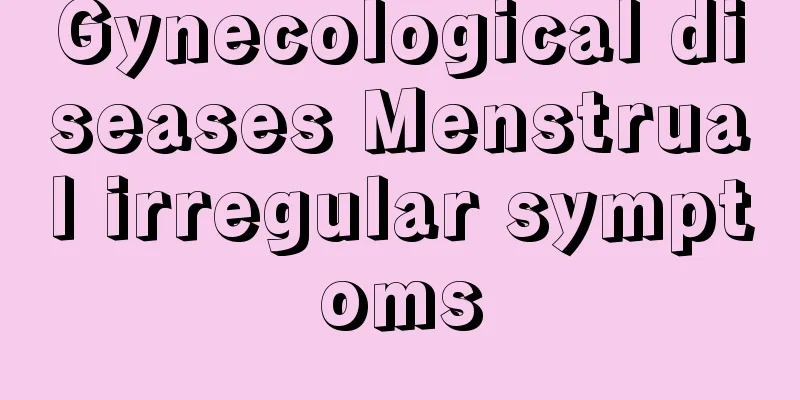Gynecological diseases Menstrual irregular symptoms

|
Irregular menstruation is a common disease among women. This type of disease has a great impact on women's physical health. When women suffer from such a disease, they should receive timely treatment, which will be very helpful in improving menstrual conditions. If irregular menstruation is not improved, it will also be harmful to women's fertility. Women should also pay attention to this. What are the symptoms of irregular menstruation caused by gynecological diseases? There are many aspects. Gynecological diseases Symptoms of irregular menstruation: 1. The color of menstrual blood: It's not normal for your menstrual blood to be watery, pink, black, or purple, or to be entirely clotted. Only dark red, sticky and clot-free blood is normal menstrual blood. 2. Menstrual cycle: Irregular menstruation, early or late menstruation, or a cycle shorter than 21 days or longer than 35 days are all abnormal. 3. Menstrual blood volume: The amount of menstrual flow varies from woman to woman. Normal women usually change their menstrual flow four or five times a day, and no more than two packs per cycle. Otherwise, too much or too little menstrual flow is abnormal. 4. Menstrual period: A woman's menstrual period is generally 3-7 days. The first 3 days are when the amount of bleeding is the heaviest, and then it will gradually decrease until there is no bleeding. Some people may have their period again a day or two after their menstrual blood stops, which is a normal phenomenon. However, if your period is as long as 10-20 days or very short, it is not normal. If a woman finds that she has irregular menstruation, she must pay extra attention and adjust the condition. During menstruation, women should not stay up late, try to get enough sleep and maintain a regular schedule. At the same time, you must keep warm during menstruation, prevent cold, and avoid cold in your lower abdomen. In terms of eating habits, you should eat more foods rich in iron to avoid iron deficiency anemia during menstruation. You should also eat more nutritious and easily digestible foods to facilitate the replenishment of nutrients. Drink more water and eat more vegetables to keep your bowels open, which can also reduce pelvic congestion. Some blood will be lost during the menstrual period. Therefore, in the later period of menstruation, you need to supplement more foods containing protein and iron, potassium, sodium, calcium and magnesium, such as meat, animal liver, eggs, milk, etc. The most important thing is to adjust your mentality, treat life and work with a happy mood, and menstruation will gradually get back on track. It is worth noting that washing your hair, swimming, having sex, smoking and drinking are all taboos during menstruation. After understanding the symptoms of gynecological menstrual disorders, the treatment of such diseases should be based on the patient's specific situation. This will greatly help alleviate the patient's disease. In addition, when treating gynecological menstrual disorders, women also need to pay attention to emotional adjustment. Emotional instability will seriously hinder the treatment of menstrual disorders. |
<<: Can adnexitis cause irregular menstruation?
>>: What to do with oral ulcers before menstruation
Recommend
"Gathering Food Safety Guide" Series | "Fresh Light" will be banned
The vegetables that look fresh and lush under the...
Postpartum vaginal itching
We all know that a woman who has just given birth...
Menstrual holidays come two days earlier every month
Every girl will experience early menstruation som...
Why does the urethra hurt after childbirth?
Many pregnant women experience this phenomenon af...
Where is the uterus located?
It has to be admitted that the uterus does play a...
Third-hand smoke is everywhere
When you walk into a private room in a hotel, you...
What should I pay attention to after cervical erosion repair surgery?
Cervical erosion is a common disease among women....
What do the "A, B, and C" categories of infectious diseases represent? Does that mean we don't have to worry about COVID-19 if it's not a category A?
"People died like sheep. The sick wandered n...
Women feel tightness in the right chest
Maybe many of us often experience chest tightness...
Is urea or compound fertilizer better for topdressing lettuce? What are the techniques for topdressing lettuce?
Lettuce is a plant that likes cool climates. Alth...
Postpartum stretch marks are itchy
Many women will have obvious stretch marks on the...
Uterine tumor pictures
Nowadays, many female friends are prone to uterin...
What to drink during menstruation to replenish blood
In fact, many women need to supplement certain nu...
What are the white bubbles on the female vulva?
Some adult female friends, due to their sexual ex...
Can men have anemia? What causes anemia in men?
Anemia is a very common physical symptom, the mos...









